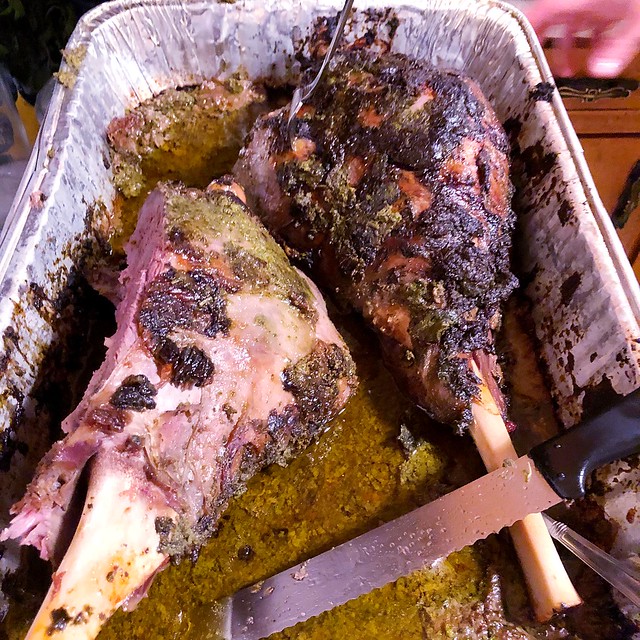Saturday, April 10, 2021
Recipe Round Up: Green Lamb and Red Eggs

cooked a couple years ago

raw with the marinade rubbed all over the meat from a few years ago
4 pounds boneless leg of lamb, or 5 pounds bone in leg of lamb
1 head garlic, peeled and separated into cloves
1/4 cup loosely packed oregano leaves
1/4 cup Italian parsley
1/4 cup mint leaves
1 large bunch of chives
8 large sprigs fresh rosemary, strip leaves off and discard stems
6 large sprigs fresh thyme
1 tablespoon kosher salt
1 teaspoon freshly ground black pepper
1/4 cup olive oil
Place lamb into heavy, stove safe, roasting pan.
Put garlic into a blender or food processor with the rest of the herbs, the salt and pepper. Process to chop up into fine bits. Add the oil, and process until a smooth purée forms.
Scrape down sides with a rubber spatula and spread over lamb, getting inside the rolled roast, if it is boneless, making sure all surfaces are well coated. Let marinate in the refrigerator for at least four hours, or up to four days. Bring meat to room temperature before cooking.
Place oven rack on second level from the bottom. Preheat oven to 500˚F.
For boneless whole leg, roast 1 hour, then reduce heat to 425˚F and roast 30 minutes more. For whole leg of lamb with bone, roast at 500˚F for 1 hour 10 minutes. Check the meat to ensure it is rare to medium rare with a dark crust. Do not cook this past medium rare. It might be fine that day, but if you have leftovers to reheat, they will be grey and overcooked and sad.
You can also grill a boneless leg of lamb, laid flat. In this manner, it will only take about 30 - 40 minutes over hot coals.
Remove meat to a serving platter, and tent with foil if you plan to make a pan sauce.
If you wish, you can deglaze the pan with 3 - 4 cups of red wine, scraping all the tasty bits off the bottom of the pan. Allow to cook for a good 10 minutes or more, until the sauce is reduced to about 2/3 the original volume. Taste for salt and pepper, and adjust as necessary. I never find I need more salt. Put in a gravy boat and pass at the table.
Traditionally, Paschal eggs are red - blood red. The eggs themselves come from the Seder meal, as we celebrate Christ our Passover. The red comes from a miracle performed by Saint Mary Magdalene in the presence of the Roman governor. Pastel eggs are pretty and fun, and there is nothing wrong with them as a decoration, but we don't do the multi-colored eggs until later in Bright Week because the day of the Resurrection we remember His blood which saves us.
Collect enough yellow onion skins to fill a stock pot. I start collecting them at the beginning of Lent, but I've also asked the produce department if I can just fill bags with their onion skins from the bins when I didn't start soon enough. I tend to use about 12 cups.
Pour 8 cups of water and 1/4 cup of white vinegar over the onion skins. Weigh them down with a plate and bring to a low boil. Cover partially and reduce the heat. Simmer for 30 minutes or more. Allow to cool completely. Strain the skins out of the dye.
You can store the dye in the refrigerator for up to a week.
Boil your eggs in the dye, for a couple minutes fewer than you normally would. Cool them in the dye, then carefully remove and polish with olive oil.
Labels: Homemaking, Keeping the Feast, Recipes, Tales from the Kitchen



